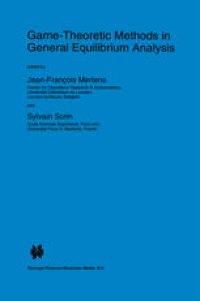
Ebook: Game-Theoretic Methods in General Equilibrium Analysis
- Tags: Econometrics, Operation Research/Decision Theory, Microeconomics
- Series: NATO ASI Series 77
- Year: 1994
- Publisher: Springer Netherlands
- Edition: 1
- Language: English
- pdf
JEAN-FRANQOIS MERTENS This book presents a systematic exposition of the use of game theoretic methods in general equilibrium analysis. Clearly the first such use was by Arrow and Debreu, with the "birth" of general equi librium theory itself, in using Nash's existence theorem (or a generalization) to prove the existence of a competitive equilibrium. But this use appeared possibly to be merely tech nical, borrowing some tools for proving a theorem. This book stresses the later contributions, were game theoretic concepts were used as such, to explain various aspects of the general equilibrium model. But clearly, each of those later approaches also provides per sea game theoretic proof of the existence of competitive equilibrium. Part A deals with the first such approach: the equality between the set of competitive equilibria of a perfectly competitive (i.e., every trader has negligible market power) economy and the core of the corresponding cooperative game.
This book presents the first systematic exposition of the use of game-theoretic methods in general equilibrium analysis. Rather than focusing on single concepts it covers all basic equivalence theorems -- core, bargaining set, Shapley and Harsanyi value, Nash equilibria -- including an axiomatic approach to them. It treats thoroughly the value of large games, and the new tools used in the strategic approach to general equilibrium.
The different chapters are written by leaders of their respective fields. The book is primarily addressed to researchers and advanced graduate students, but being largely self-contained, it can also be used as a text for a course.
This book presents the first systematic exposition of the use of game-theoretic methods in general equilibrium analysis. Rather than focusing on single concepts it covers all basic equivalence theorems -- core, bargaining set, Shapley and Harsanyi value, Nash equilibria -- including an axiomatic approach to them. It treats thoroughly the value of large games, and the new tools used in the strategic approach to general equilibrium.
The different chapters are written by leaders of their respective fields. The book is primarily addressed to researchers and advanced graduate students, but being largely self-contained, it can also be used as a text for a course.
Content:
Front Matter....Pages i-9
Introduction....Pages 11-13
Front Matter....Pages 15-15
General Equilibrium and Cooperative Games: Basic Results....Pages 17-33
Core Convergence in Perfectly Competitive Economies....Pages 35-45
Economies with Atoms....Pages 47-50
Bargaining Sets....Pages 51-58
Front Matter....Pages 59-59
The Shapley Value....Pages 61-66
Value of Games with a Continuum of Players....Pages 67-79
The TU Value: The Non-differentiable Case....Pages 81-94
Addendum: The Shapley value of a perfectly competitive market may not exist....Pages 95-104
The Harsanyi Value....Pages 105-111
Value Equivalence Theorems: The TU and NTU Cases....Pages 113-120
Economic Applications of the Shapley Value....Pages 121-133
Front Matter....Pages 135-135
An Axiomatic Approach to the Equivalence Phenomenon....Pages 137-144
Large Games and Economies with Effective Small Groups....Pages 145-206
Front Matter....Pages 207-207
Strategic Market Games: a Survey of Some Results....Pages 209-224
From Nash to Walras Equilibrium....Pages 225-241
Correlated- and Communication Equilibria....Pages 243-248
Notes on Correlated Equilibrium and Sunspot Equilibrium....Pages 249-260
Implementation with Plain Conversation....Pages 261-268
This book presents the first systematic exposition of the use of game-theoretic methods in general equilibrium analysis. Rather than focusing on single concepts it covers all basic equivalence theorems -- core, bargaining set, Shapley and Harsanyi value, Nash equilibria -- including an axiomatic approach to them. It treats thoroughly the value of large games, and the new tools used in the strategic approach to general equilibrium.
The different chapters are written by leaders of their respective fields. The book is primarily addressed to researchers and advanced graduate students, but being largely self-contained, it can also be used as a text for a course.
Content:
Front Matter....Pages i-9
Introduction....Pages 11-13
Front Matter....Pages 15-15
General Equilibrium and Cooperative Games: Basic Results....Pages 17-33
Core Convergence in Perfectly Competitive Economies....Pages 35-45
Economies with Atoms....Pages 47-50
Bargaining Sets....Pages 51-58
Front Matter....Pages 59-59
The Shapley Value....Pages 61-66
Value of Games with a Continuum of Players....Pages 67-79
The TU Value: The Non-differentiable Case....Pages 81-94
Addendum: The Shapley value of a perfectly competitive market may not exist....Pages 95-104
The Harsanyi Value....Pages 105-111
Value Equivalence Theorems: The TU and NTU Cases....Pages 113-120
Economic Applications of the Shapley Value....Pages 121-133
Front Matter....Pages 135-135
An Axiomatic Approach to the Equivalence Phenomenon....Pages 137-144
Large Games and Economies with Effective Small Groups....Pages 145-206
Front Matter....Pages 207-207
Strategic Market Games: a Survey of Some Results....Pages 209-224
From Nash to Walras Equilibrium....Pages 225-241
Correlated- and Communication Equilibria....Pages 243-248
Notes on Correlated Equilibrium and Sunspot Equilibrium....Pages 249-260
Implementation with Plain Conversation....Pages 261-268
....